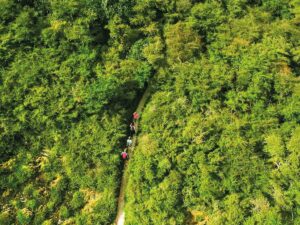I have never forgotten my first sighting of a herd of slim, delicately elegant vicuñas picking their way across the altiplano in the remote northern reaches of Chile. It was an electric moment.
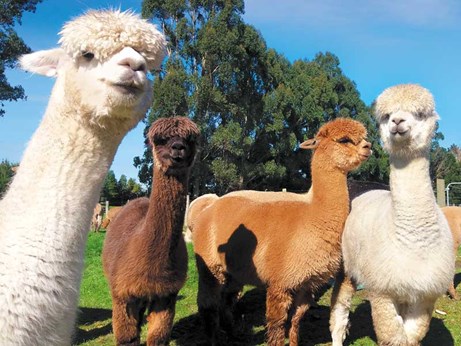 |
It’s easy to fall in love with these placid and friendly animals |
These nimble, ginger-coloured camelids are not only beautiful but now an endangered species. Last week, back in New Zealand, I visited the small Cornerstone Alpaca Stud in Gordonton and made the discovery that vicuñas are the wild ancestors of the domesticated alpaca, those fluffy, gentle little doe-eyed animals that tug at the heart strings and provide one of the softest, warmest and most sought-after fibres in the world.
When I joined a tour at the Cornerstone Stud near Hamilton, I learnt many other things about alpacas. This small Waikato farm is owned by Sonja and David Blom, who emigrated to New Zealand from South Africa in 2005.
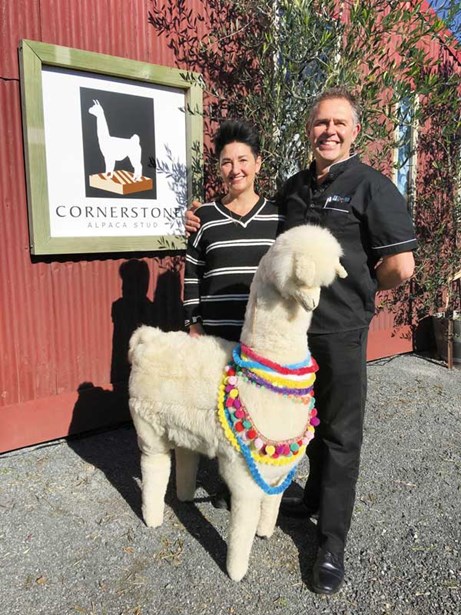 |
Cornerstone owners Sonja and David Blom |
Although David is a dentist by profession he also had bred cattle in his home country, and when the couple arrived here they decided to looked around for something to farm.
“At the Hamilton Fieldays we came across a pen of alpacas,” said Sonja, “and when we looked at their little faces we fell in love.” Alpaca not only win hearts, they are sociable, easy to breed and raise, and friendly towards humans.
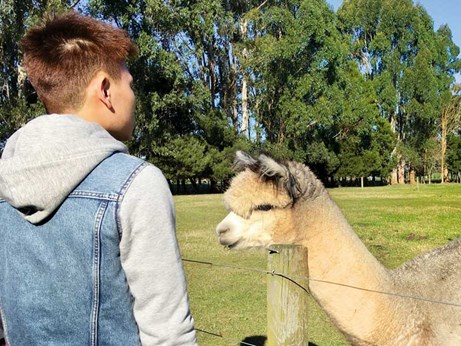 |
Meeting and greeting |
Well not that friendly. Annoy them and they spit. That’s not too bad because at first it’s only saliva. A more deeply disturbed animal, however, might hurl a gob of foul smelling green sludge. Thankfully this missile is most often directed at their own kind.
The Bloms bought four adult animals and one baby for their small holding in Raglan. The experiment showed them a way forward and a few years later they expanded to the four-hectare property in Gordonton, where they started breeding alpaca in earnest.
There are now around 160 animals. The top bloodlines are bred for their fibre and the others to sell as pets. “A pet alpaca sells for around $380,” said Herman Van Niekerk, who is the farm tour guide at Cornerstone. “But you can’t buy just one alpaca.
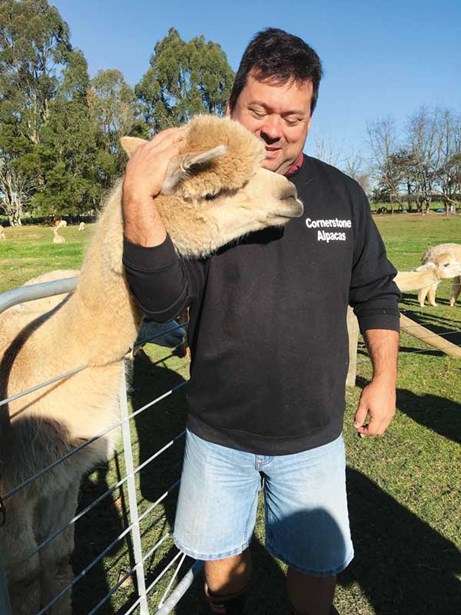 |
Tour manager, Herman van Niekerk, and friend |
They are very sociable and if they don’t have a friend, they will become depressed and maybe even die. Two is okay and three is better.” In New Zealand the number of alpacas bred or imported either for their fibre or as pets is growing.
There are now an estimated 28,000 in the country. By 2014 the Bloms had so much confidence in the quality of their class A herd that they started competing. In the converted barn that serves as reception, retail store and education centre, walls and railings are festooned with the coloured ribbons that the fibre from the progeny has won.
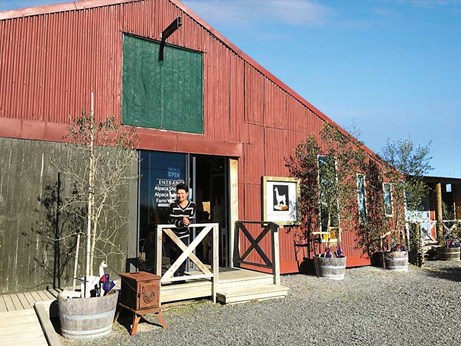 |
A converted barn is the centrepoint of the farm |
On one wall hang posters of their champion alpacas Dulce, Invincible and Macchiato. “The judging is purely on the quality of the fibre,” explained Herman. “It’s a fabulous product – not just soft and warm, but durable, silky and hypoallergenic.” He handed me a sample.
It felt like a cloud. After an informative chat we walked outside to mingle with the animals. They came towards us eagerly, not driven by affection or curiosity, but because they had spotted Herman’s food bucket.
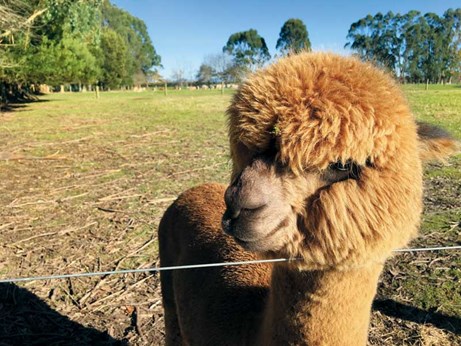 |
The cuddly and cute Verona |
Three showy alpaca were in the first paddock: the puffball-faced, ginger-coloured, Verona; Lord Grey, who was a smoky colour, and a sleeker jet-black girl called Taffy, who is apparently a champion spitter.
In the two other paddocks the alpaca were mostly white or lightly coloured. They looked a bit like sheep with long necks and they gathered around like school kids to softly nibble at us with their hairy lips.
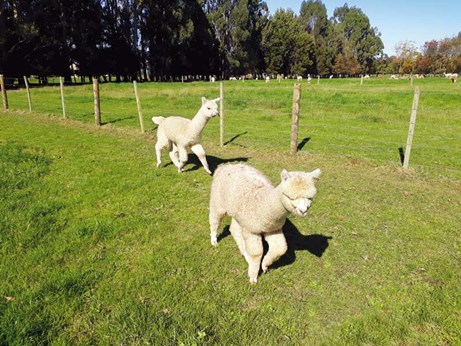 |
The alpacas look like sheep with long necks |
I felt my affection growing and I didn’t like to contemplate the fact that their meat is considered a low-fat alternative to beef. For me dining on alpaca steaks would feel like a betrayal.
The animals are shorn once a year, a stressful and complicated process which Herman tried to demonstrate. Watching this performance I decided it was a good thing that alpaca shearers are specialists who travel around the country from one herd to the next.
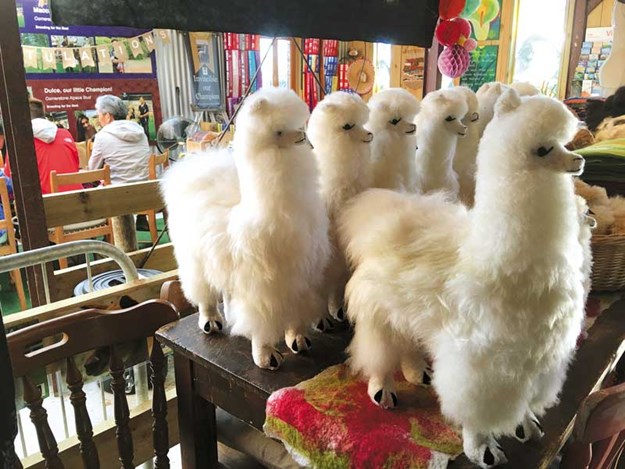 |
The barn has been remodelled into an education centre, retail store and a place to hang the winning ribbons |
The end products of the process can be seen inside the Cornerstone barn – incredibly warm rugs, blankets, scarves, felted necks cravats, and a range of souvenirs. I left empty-handed but internally warmed by my short encounter with these endearing little animals that hail from South America.
Win an alpaca tour for two with Cornerstone Alpaca Stud, valued at $70
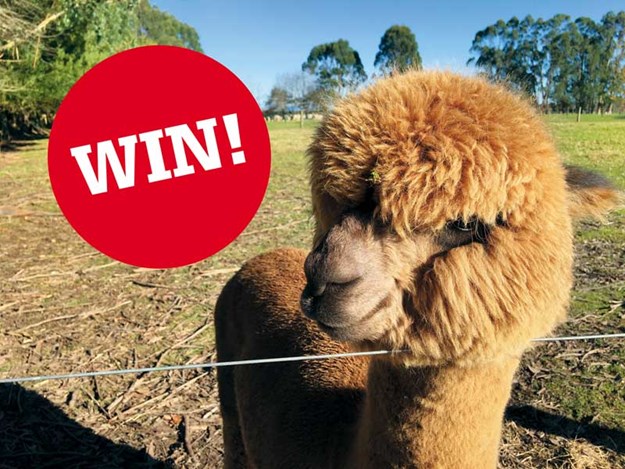
Be in to win an alpaca tour for two with Cornerstone Alpaca Stud, valued at $70. Enter here before 26 July, 2019.

